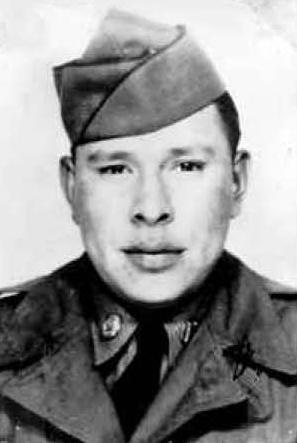
The Lakota people take Memorial Day and Veterans Day very seriously.
It is more than just a picnic or a day off from work or school.
We remember those who fought for this country with songs, prayers, dancing and a feast at least twice a year.
I remember when I was a child around five or six years old, my grandmother, Alice Deer With Horns,
would talk and visit with the soldiers. Now the troops would come in a convoy through my reservation, the Cheyenne River Sioux,
and would stop at the community town where I grew up, along Highway 212. The name of the town was called La Plant.
Grandma would sing and say prayers for the troops, and for their relatives and loved ones.
She sang for the men and women in the service and those that were killed in a war.
She did this out of respect and honor for the soldiers.
It did not matter what race, ethnic background or religion they may have been.
Grandma Alice did not know the troops, but it was the representation of the troops as defenders of America that she did this for.
In turn, the soldiers respected her and many would cry and pray with her.
They got encouragement that they would return home to their families safe.
In the Lakota culture, defending the country is considered a high honor, and the veterans were always respected.
Even during the Vietnam War, our soldiers returning home were shown the same
respect and honor as during the Second World War.
When a soldier returns home, a powwow is held for him or her.
The family has a give away which means they make or buy things during the year,
and give them away to the people at the event out of respect for the returning soldier.
Today, we also have parades when soldiers return from a war.
A powwow is held, and a big feast and give away is also done at this time in their honor.
An Eagle feather is presented to the soldier who fought in battle.
The Lakota people, and many Native Americans, are proud to fight for America. It is our land, our country.
My Uncle Earl fought in the Korean War and wore his uniform, which he was very proud of, in the parades.
Uncle Earl had his medals and pictures of his war buddies on display
and loved to reminisce about his "war days."
Uncle Earl practiced both the Lakota Spirituality and the Christian ways.
"We all believe in the same God or Creator" he said.
As often as possible, Uncle Earl tried to visit some of his war time buddies.
Not too many are left any more, and sometimes he traveled from South Dakota to New Jersey or Virginia to visit with them.
A proud man, Uncle Earl joined the Army when his brother, my Uncle Will, was missing in action.
As a young man, Uncle Earl was determined to go to Korea and find his brother and bring him home.
Uncle Will died while a POW of the North Koreans, but Uncle Earl felt he did what was right in his heart.
He never regreted for one moment serving his country.
He sang for his brother, he sang for his buddies, and he sang for all the soldiers and their families.
" I am getting old now", he would say." When I sing, it makes me feel happy"
The internet brought a wonderful man into my life, Mr. Tom Lyke.
Through Mr.Lyke my uncle Earl was able to submit a DNA sample so Uncle Will's remains may be identified.
After all these year, Uncle Will can come back home.
Uncle Earl passed on but his spirit is always with us.
Tunkašilayapi tawapaha kin oihankešni najin kte lo
Iyoh^late oyate kin wicicagin kta ca hecamon welo
He yuha natan pe
He yuha natan pe
Tunkašilayapi tawapaha ca he yuha natan pelo
Lakhota hokšila he ohitika ca he yuha natan pe
Tunkašilayapi tawapaha ca he yuha natan pelo
The flag of the United States will fly forever
Beneath it, the people will grow
That is why I do this
They are carrying it charging
They are carrying it charging
They are carrying the flag of the United States, charging
The brave Lakota boys are carrying it, charging
They are carrying the flag of the United States, charging






